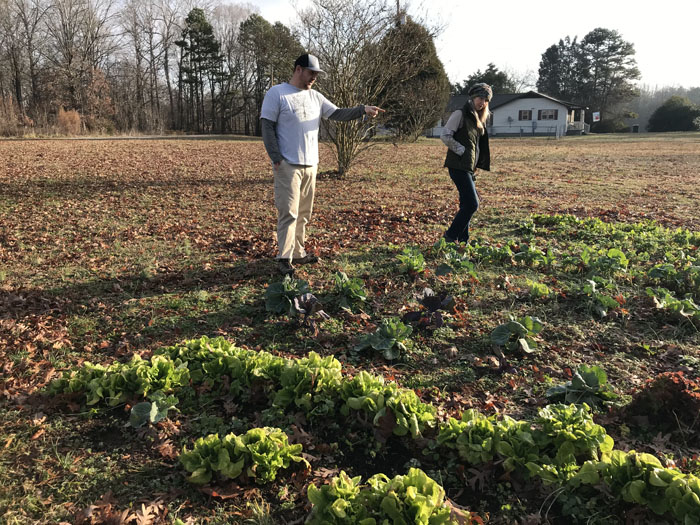My Turn, Ashley Honbarrier: All Rowan schools need funded garden programs
Published 12:00 am Sunday, November 28, 2021

- Andie Foley/For the Salisbury Post. Happy Roots team members Aron Burleson and Ashley Honbarrier look over vegetables growing for Oak Park Retirement’s residents.
“To be a human being is an honor, and we offer thanksgiving for all the gifts of life. Mother Earth, we thank you for giving us everything we need.”
– Chief Jake Swamp, giving thanks
By Ashley Honbarrier
As we approach these feasting holidays, while honoring Native American Heritage Month and just following National Farm to School Month, it is so important to raise awareness on a special and crucial item that’s all encompassing: food.
We eat to live. We eat to celebrate. Food is our lifeline. Food is power. Food can also be our worst enemy. With ever-advancing technology, we’re at a pivotal point where we do not even need to step foot in the grocery store, let alone grow our own food.
But is that a good thing?
The first true, self-service grocery store opened as a Piggly Wiggly in Memphis, Tennessee, in 1916. Instead of passing a small basic list to a store clerk, customers for the first time shopped for themselves. Throughout the 1950s, the supermarket proved itself to be an American phenomenon. In 1957, President Dwight D. Eisenhower, Queen Elizabeth, and Prince Philip visited a Maryland grocery store to see what the hype was all about. The queen was bemused by the shopping cart’s collapsible little seat, saying it was particularly nice to be able to bring children along.
Children in supermarkets drastically changed the game of branding, advertising and our health, strategically placing attractive products at their eye level.
We have been victims ever since.
Some quick facts here to consider while reading this:
• Agriculture continues to be North Carolina’s No. 1 industry.
• North Carolina is ranked among the worst in the nation in health care.
• In the 1900s, just under 40% of the total U.S. population lived on farms. Today, farmers and ranchers make up less than 2%!
Did you know the average age of the American farmer is 60 years? No offense to farmers, but that is terrifying.
We as North Carolinians have the advantage here and should be paving the way for our youth to take the lead and revolutionize our food and healthcare systems. This is a bipartisan movement that we all can, and need, to get behind.
For centuries, Native Americans have carefully cultivated the soil. Stories, ceremonies, songs and cultural traditions surround the annual planting, growing and harvest of gardens. Stories such as the Three Sisters Garden (using corn, beans, and squash) is one technique we teach and practice right here in our Rowan County school gardens.
Do you think the Native Americans used irrigation, pesticides, herbicides and some of the other land degrading methods we use today? Not really. They found ways live in harmony with nature and the land.
In the Three Sisters Garden lesson, we learn that we do not have to fight. We can work together. We form companion plants. In this case, beans are the nitrogen fixers, pulling nitrogen from the air and with the help of soil microbes that turns nitrogen into plant food. The corn provides the beans a support system on which to grow, and the squash aids in water retention and works as weed control.
These companion planting techniques are endless, as are all lessons in the garden.
Happy Roots’ programs connect children and individuals to nature, gardening, food and health. Plants provide everything we need as humans, food, shelter, medicine, clothing and tools. Our connection with plants and nature is vital.
With political change, power change, societal change and climate change, we are at a turning point. What is most important? What should we prioritize as far as education for our youth?
Through school garden education, I only see win-win. We teach children the life skills of growing their own food, hands-on STEM education, vocational skills as well as the therapeutic benefits and land stewardship that come from the work. The garden is an outdoor classroom where we can deescalate, regain respect for the land, our food, and ourselves through healthy work ethic.
Life lessons are learned throughout the gardening seasons.
These reasons are why we are striving for a funded school and community garden coordinator position in Rowan County. Other N.C. counties are currently leading the way by investing and providing services such gardening and support. With Happy Roots serving 20 Rowan County schools, 10 other neighborhood and community garden projects and growing, we have proven what we can do just based off community donations. Let’s consider putting some funds towards this to take it to the next level — for ourselves, our community, our children, and our future.
Imagine how much we could change our corner of the world if every Rowan County school had a successful school garden program.
Maybe that is just what we need for humanity. Please support your school and community gardens.
Happy Roots is a proud partner of Rowan Food and Farm Network, National Farm to School Association, N.C. Community Garden Partners, Farm to School Coalition of N.C. and N.C. School Garden Network. Honbarrier leads the nonprofit.

